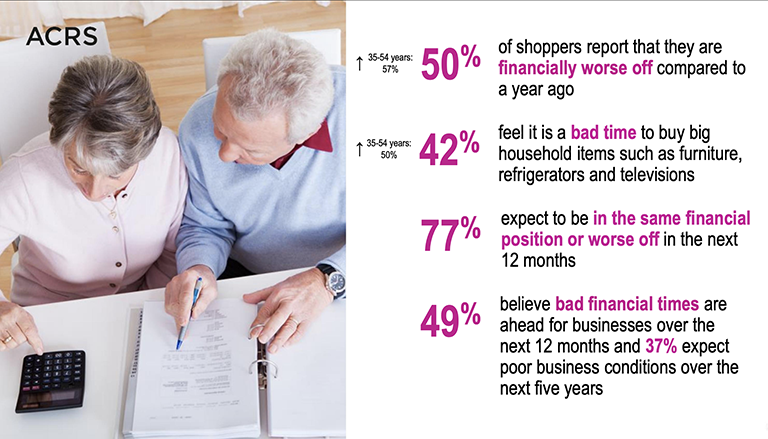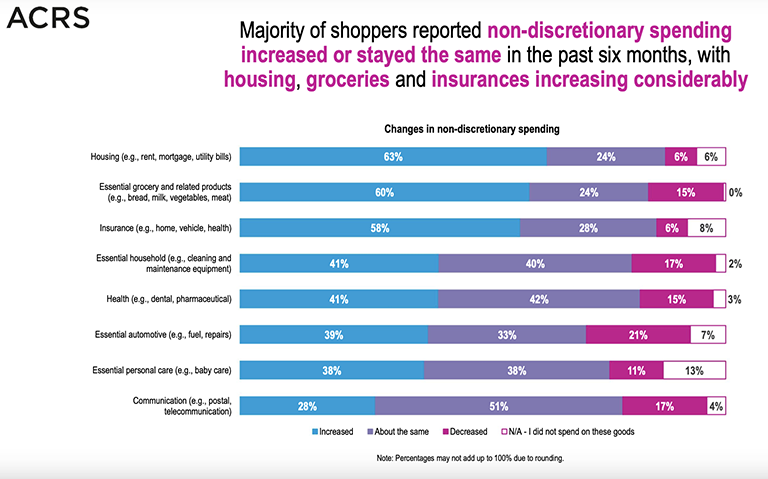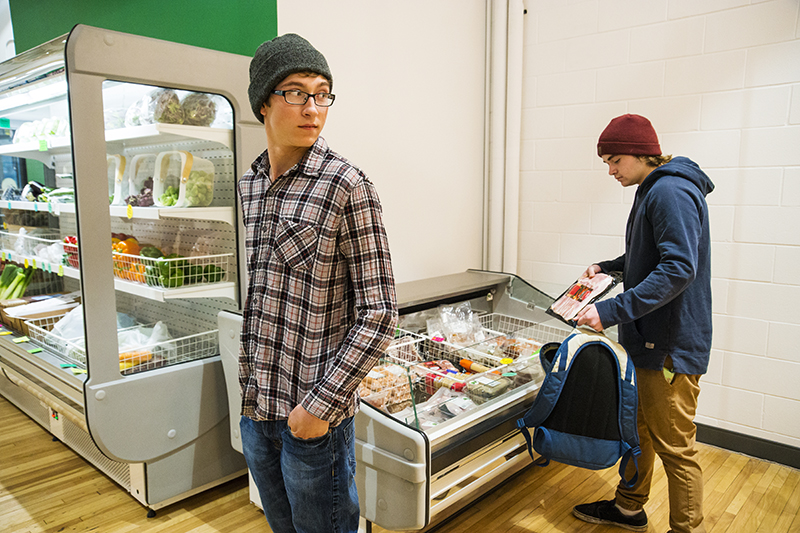The cost-of-living crisis continues to pressure Aussie households, and consumers are feeling the crunch.
The latest ACRS Cost-of-Living and Consumer Deviance Spotlight report adds further context to the trying financial times experienced by consumers, and the potentially desperate deviance consumers may be willing to take.
The Westpac-Melbourne Institute Index of Consumer Sentiment reported a pessimist-favoured score of 79.7 in September, a vast departure from a neutral 100, and has been recording near recession lows for more than a year.
It’s no surprise consumers are re-evaluating their budgets in anticipation of ongoing financial pressures.
The latest Australian Bureau of Statistics [ABS] Monthly Household Spending Indicator reported a marginal 0.7% decrease of household spending through the year to July, despite a 2.1% growth in total retail turnover during the same period.
So how are consumers managing financial pressures in their day-to-day lives? Monash Business School’s Australian Consumer and Retail Studies (ACRS) conducted research into attitudes and behaviours of Australian shoppers towards cost-of-living and consumer deviance as part of a larger study, the ACRS Retail Monitor.
The latest ACRS Cost-of-Living and Consumer Deviance Spotlight report adds further context to the trying financial times experienced by consumers, how they’re changing their behaviours to relieve financial pressures, and the potentially desperate deviance consumers may be willing to take.
Bleak outlook for Aussie households
Findings from our research indicate consumers are pessimistic about their current and future personal finances, as well as expectations of future business conditions.

Among Aussie shoppers, 50% reported they’re financially worse off compared to a year ago, while two out of five consumers (42%) indicated it’s a bad time to buy big-ticket items such as furniture, refrigerators, and televisions.
Among all age groups, consumers aged 35-54 are the most pessimistic about their financial situations. Specifically, significantly more consumers in that age group reported being financially worse off compared to last year (57%), and were more resistant to buying big-ticket items (50%) compared to other age groups.
Concerningly, 77% of consumers expect to be in the same financial position or worse off in the next 12 months. In addition, nearly half of consumers (49%) expect poor business conditions over the next 12 months, and more than a third (37%) expect poor business conditions over the next five years.
Balancing the books
Consumers have changed their spending habits to alleviate some of the financial pressure. Many Aussies are offsetting increases to non-discretionary spending (for example, housing, essential groceries, insurance) with decreases in discretionary spending (including restaurant and takeaway meals, clothing, footwear and accessories) to meet the current costs of living.
About three out of five Aussie shoppers reported increases to their non-discretionary spending for housing (63%), essential grocery and related products (60%), and insurance (58%) in the past six months. However, basket sizes for these categories largely stayed the same.
When it comes to discretionary spending, a third or more of consumers indicated they’ve decreased spending on takeaway and restaurant meals (37%), apparel including clothing, footwear and accessories (35%), and consumer electronics (33%) in the past six months.
In the same period, a third of consumers did not purchase sporting goods and equipment, or toys and games (both 33%), and more than a quarter didn’t purchase alcohol and tobacco products (27%).
Similar trends are reported by the ABS, which has shown a 1.7% increase in non-discretionary spending and 3.3% decrease in discretionary spending. Moreover, not only are consumers changing the way they spend, they’re also increasing their sources of income to cover increasing costs – 959,000 people held multiple jobs in June 2023, an increase of 7% over the past year.
Do desperate times call for desperate measures?
In light of the increased cost-of-living, fears among retail businesses have been growing. Sadly, retailers not only face the issue of decreasing consumer spend, but they also need to be wary of opportunistic consumers looking to save money through more deviant means.
Shoplifting has re-entered the spotlight, as thefts occurring at retail locations have increased for a second straight year – up 17% between 2021 and 2022.
Surprisingly, more than a quarter of consumers believed that blatant forms of retail theft were ‘a little to completely’ justifiable.
Moreover, newly-appointed Coles CEO Leah Weckert recently reported a 20% increase in stock loss (that is, theft and food wastage) in 2023 compared to last year.
To explore consumers’ attitudes towards retail theft, we asked shoppers to rate the justifiability of a range of behaviours given the current economic conditions. Surprisingly, more than a quarter of consumers believed that blatant forms of retail theft were ‘a little to completely’ justifiable.
Specifically, ‘taking an item without paying’ was perceived as ‘a little to completely’ justifiable for 28% of shoppers, followed by ‘changing price tags on products’(30%), ‘not scanning some items when using a self-checkout terminal’ (32%), and ‘scanning items as cheaper items when using a self-checkout terminal’ (37%).

Interestingly, there were stark differences in how justifiable these deviant behaviours were viewed by different age groups.
Significantly more older consumers (55-plus years of age) considered retail theft behaviours as ‘not at all’ justifiable compared to other age groups, while significantly more younger consumers (18-34 years of age) indicated that forms of theft are a ‘little’ to ‘completely’ justifiable.
For example, ‘taking an item without paying’ for it was ‘not at all’ justifiable to 93% of older consumers but only 47% of younger consumers, while the remaining 53% of the latter group felt it was ‘a little to completely’ justifiable. Similarly, ‘changing price tags on products’ was ‘not at all’ justifiable to 90% of older consumers versus 45% of younger consumers.
Cracking down on deviance
Earlier this year, the Australian Retailers Association’s CEO, Paul Zahra, called for state and territory governments to implement tougher retail crime penalties, allocate more police resources, and incorporate better technology to protect retail workers.
Retail associations and retailers have sprung into action to crack down on retail crime. Earlier this year, the Australian Retailers Association’s CEO, Paul Zahra, called for state and territory governments to implement tougher retail crime penalties, allocate more police resources, and incorporate better technology to protect retail workers.
Supermarket giants Coles and Woolworths have increased physical security and are implementing new surveillance technology (such as additional cameras, assisted scanning, and smart gates) to better identify and monitor retail crime, as well as to keep retail workers and honest shoppers safe.
Much of the consumer financial pessimism and changes in spending habits has been attributed to inflation and expectations of ongoing rate increases, which will need to abate before any significant changes to consumer confidence can be seen.
Note about the research: The ACRS Retail Monitor investigates Australian consumers’ shopping preferences, attitudes, and behaviour. Data on cost-of-living and consumer deviance was collected from n=1,001 randomly-selected Australian shoppers in June 2023.
About the Authors
 Stephanie Atto is Research & Strategy Director at the ACRS research unit, a commercial research and insights consultancy operating out of Monash Business School’s Department of Marketing. As an applied researcher, Stephanie partners with clients across industries including retail property owners/managers and other retail businesses, FMCG, government, and social enterprise. Stephanie’s research focuses on various aspects of the consumer experience – ranging from decision making and behaviour, national and global trend analysis, and environmental drivers – to enable both businesses and consumers to make informed decisions and create change.
Stephanie Atto is Research & Strategy Director at the ACRS research unit, a commercial research and insights consultancy operating out of Monash Business School’s Department of Marketing. As an applied researcher, Stephanie partners with clients across industries including retail property owners/managers and other retail businesses, FMCG, government, and social enterprise. Stephanie’s research focuses on various aspects of the consumer experience – ranging from decision making and behaviour, national and global trend analysis, and environmental drivers – to enable both businesses and consumers to make informed decisions and create change.
 Paolo de Leon is a senior research consultant in the ACRS research unit at Monash Business School’s Department of Marketing. He’s experienced with both qualitative and quantitative research methodologies. At ACRS, Paolo has applied his diverse research skills and breadth of marketing knowledge in delivering thought leadership, and customer experience. He’s also worked on tracking projects for a wide range of industries, including retail, automotive, and property management.
Paolo de Leon is a senior research consultant in the ACRS research unit at Monash Business School’s Department of Marketing. He’s experienced with both qualitative and quantitative research methodologies. At ACRS, Paolo has applied his diverse research skills and breadth of marketing knowledge in delivering thought leadership, and customer experience. He’s also worked on tracking projects for a wide range of industries, including retail, automotive, and property management.
This article first appeared on the Monash Lens, and is republished under a Creative Commons Licence; you can read the original here.
Picture © Fertnig / iStockphoto


